Exploring Early Childhood Education: Characteristics & Aspirations
VerifiedAdded on 2023/05/30
|6
|1760
|152
Essay
AI Summary
This essay explores the essential characteristics, knowledge, and experiences required for an effective Early Learning and Child Care (ELCC) educator. It emphasizes the importance of personal qualities such as compassion, patience, creativity, and respect for diversity, as well as professional skills including a bachelor's degree and experience in childcare. The essay also examines how early childhood professionals contribute to the quality of early learning programs by nurturing friendships, encouraging learning, and fostering communication skills. Furthermore, the author reflects on their own strengths and areas for improvement, highlighting the significance of values and beliefs in shaping their practice and work with children and families. The essay concludes by outlining the author's goals and aspirations in the field, including a desire to support underprivileged children and establish an organization dedicated to childcare and health, emphasizing the need for further education and experience in child psychology and management.
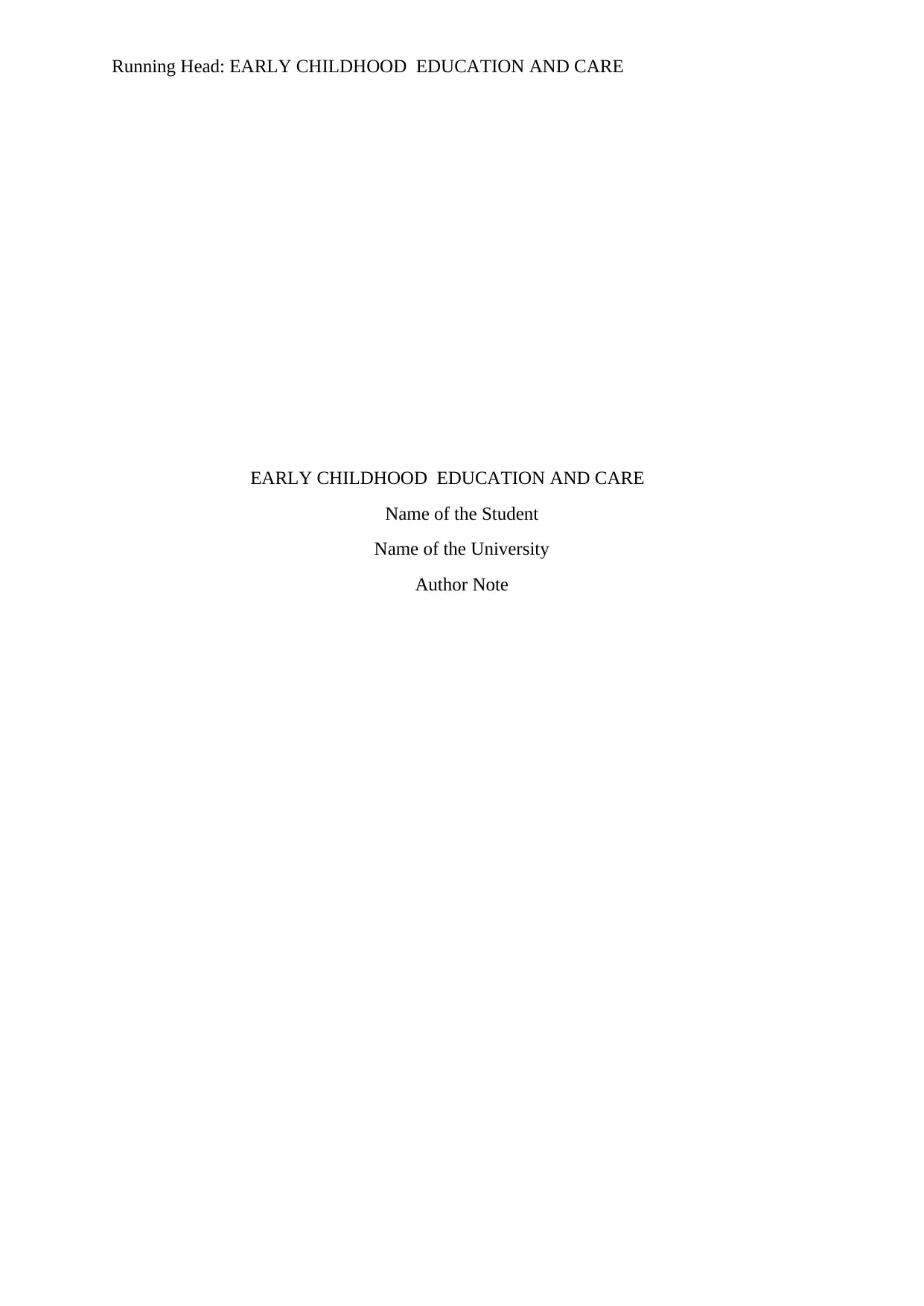
Running Head: EARLY CHILDHOOD EDUCATION AND CARE
EARLY CHILDHOOD EDUCATION AND CARE
Name of the Student
Name of the University
Author Note
EARLY CHILDHOOD EDUCATION AND CARE
Name of the Student
Name of the University
Author Note
Paraphrase This Document
Need a fresh take? Get an instant paraphrase of this document with our AI Paraphraser
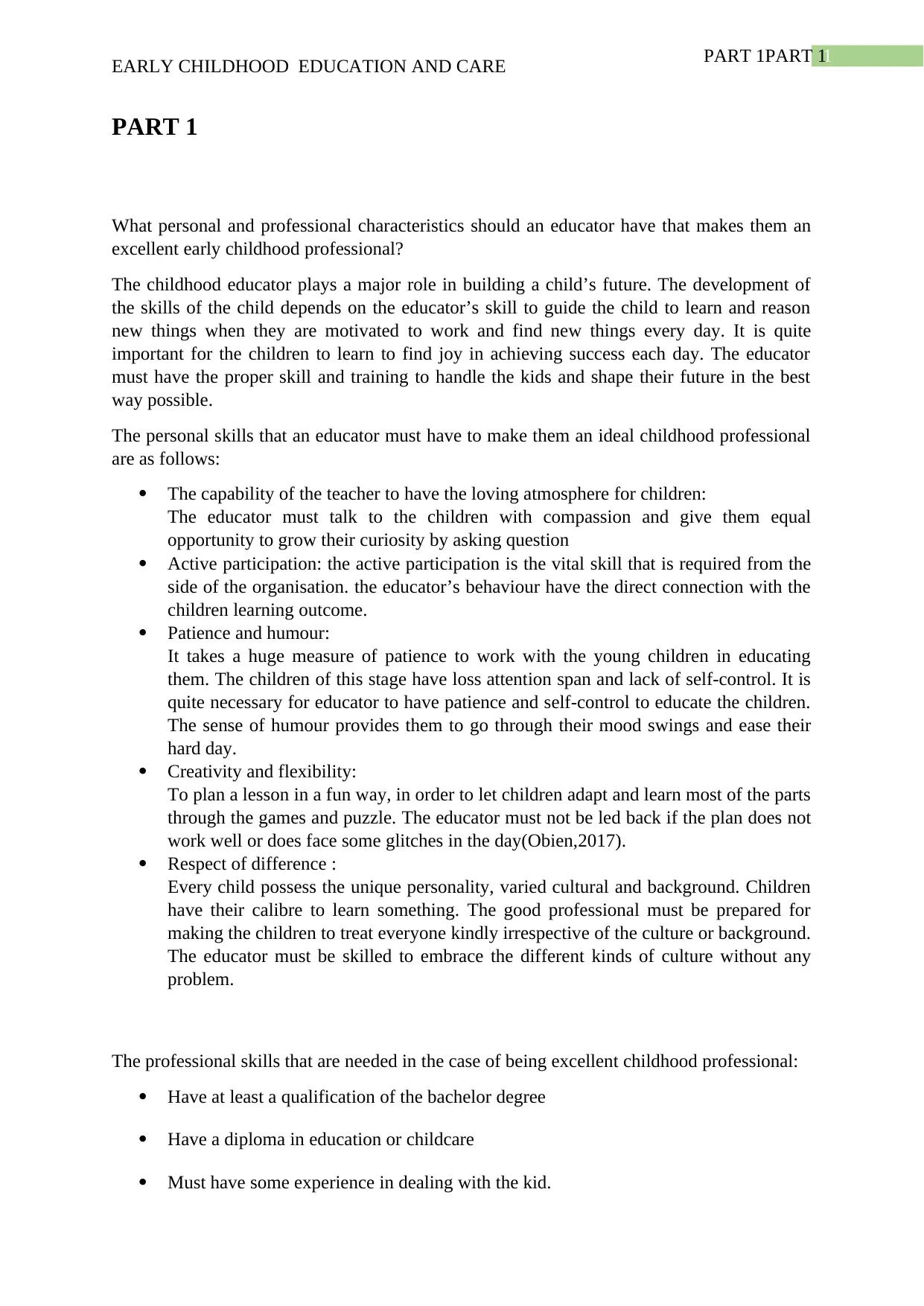
1PART 1PART 1
EARLY CHILDHOOD EDUCATION AND CARE
PART 1
What personal and professional characteristics should an educator have that makes them an
excellent early childhood professional?
The childhood educator plays a major role in building a child’s future. The development of
the skills of the child depends on the educator’s skill to guide the child to learn and reason
new things when they are motivated to work and find new things every day. It is quite
important for the children to learn to find joy in achieving success each day. The educator
must have the proper skill and training to handle the kids and shape their future in the best
way possible.
The personal skills that an educator must have to make them an ideal childhood professional
are as follows:
The capability of the teacher to have the loving atmosphere for children:
The educator must talk to the children with compassion and give them equal
opportunity to grow their curiosity by asking question
Active participation: the active participation is the vital skill that is required from the
side of the organisation. the educator’s behaviour have the direct connection with the
children learning outcome.
Patience and humour:
It takes a huge measure of patience to work with the young children in educating
them. The children of this stage have loss attention span and lack of self-control. It is
quite necessary for educator to have patience and self-control to educate the children.
The sense of humour provides them to go through their mood swings and ease their
hard day.
Creativity and flexibility:
To plan a lesson in a fun way, in order to let children adapt and learn most of the parts
through the games and puzzle. The educator must not be led back if the plan does not
work well or does face some glitches in the day(Obien,2017).
Respect of difference :
Every child possess the unique personality, varied cultural and background. Children
have their calibre to learn something. The good professional must be prepared for
making the children to treat everyone kindly irrespective of the culture or background.
The educator must be skilled to embrace the different kinds of culture without any
problem.
The professional skills that are needed in the case of being excellent childhood professional:
Have at least a qualification of the bachelor degree
Have a diploma in education or childcare
Must have some experience in dealing with the kid.
EARLY CHILDHOOD EDUCATION AND CARE
PART 1
What personal and professional characteristics should an educator have that makes them an
excellent early childhood professional?
The childhood educator plays a major role in building a child’s future. The development of
the skills of the child depends on the educator’s skill to guide the child to learn and reason
new things when they are motivated to work and find new things every day. It is quite
important for the children to learn to find joy in achieving success each day. The educator
must have the proper skill and training to handle the kids and shape their future in the best
way possible.
The personal skills that an educator must have to make them an ideal childhood professional
are as follows:
The capability of the teacher to have the loving atmosphere for children:
The educator must talk to the children with compassion and give them equal
opportunity to grow their curiosity by asking question
Active participation: the active participation is the vital skill that is required from the
side of the organisation. the educator’s behaviour have the direct connection with the
children learning outcome.
Patience and humour:
It takes a huge measure of patience to work with the young children in educating
them. The children of this stage have loss attention span and lack of self-control. It is
quite necessary for educator to have patience and self-control to educate the children.
The sense of humour provides them to go through their mood swings and ease their
hard day.
Creativity and flexibility:
To plan a lesson in a fun way, in order to let children adapt and learn most of the parts
through the games and puzzle. The educator must not be led back if the plan does not
work well or does face some glitches in the day(Obien,2017).
Respect of difference :
Every child possess the unique personality, varied cultural and background. Children
have their calibre to learn something. The good professional must be prepared for
making the children to treat everyone kindly irrespective of the culture or background.
The educator must be skilled to embrace the different kinds of culture without any
problem.
The professional skills that are needed in the case of being excellent childhood professional:
Have at least a qualification of the bachelor degree
Have a diploma in education or childcare
Must have some experience in dealing with the kid.
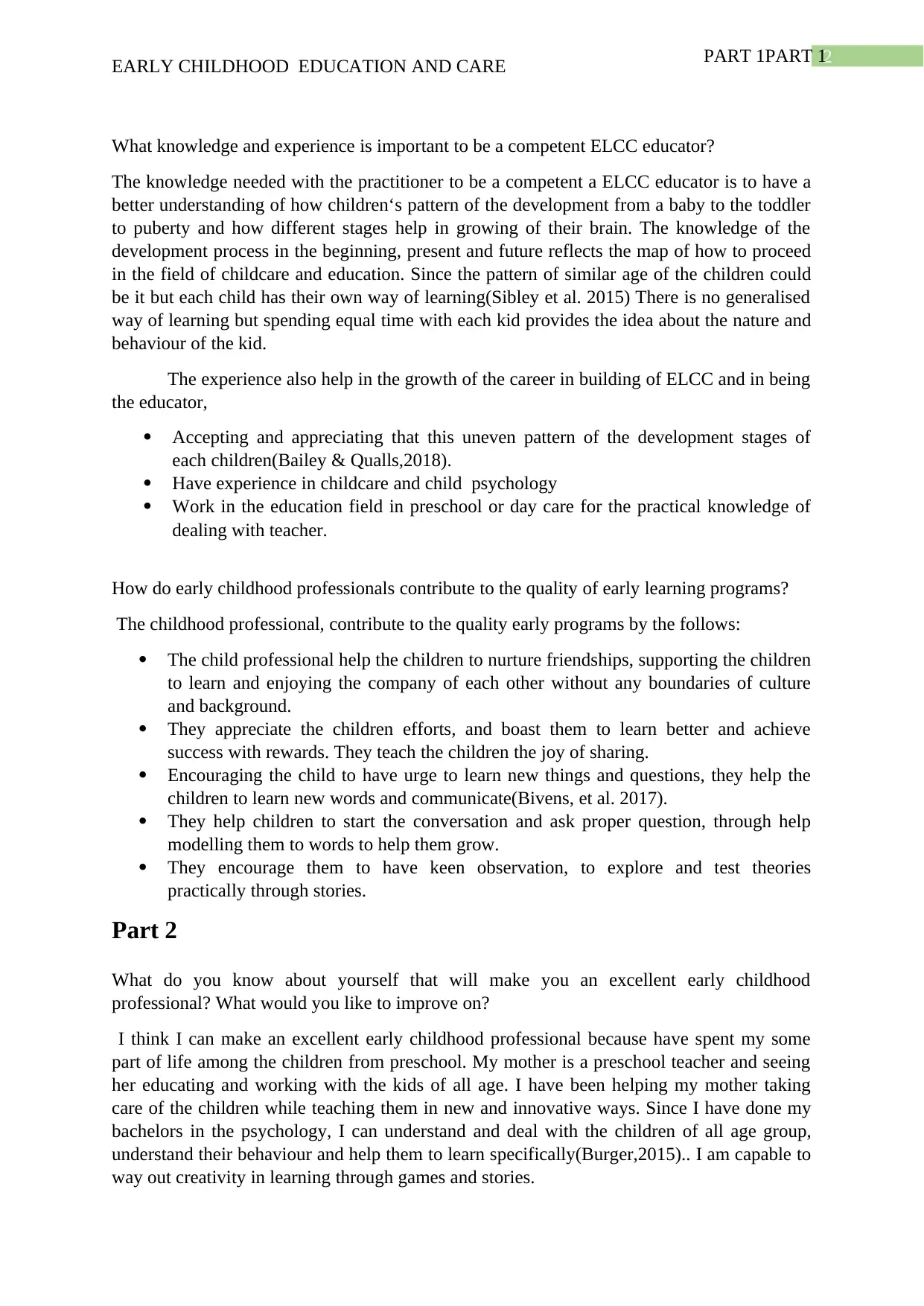
2PART 1PART 1
EARLY CHILDHOOD EDUCATION AND CARE
What knowledge and experience is important to be a competent ELCC educator?
The knowledge needed with the practitioner to be a competent a ELCC educator is to have a
better understanding of how children‘s pattern of the development from a baby to the toddler
to puberty and how different stages help in growing of their brain. The knowledge of the
development process in the beginning, present and future reflects the map of how to proceed
in the field of childcare and education. Since the pattern of similar age of the children could
be it but each child has their own way of learning(Sibley et al. 2015) There is no generalised
way of learning but spending equal time with each kid provides the idea about the nature and
behaviour of the kid.
The experience also help in the growth of the career in building of ELCC and in being
the educator,
Accepting and appreciating that this uneven pattern of the development stages of
each children(Bailey & Qualls,2018).
Have experience in childcare and child psychology
Work in the education field in preschool or day care for the practical knowledge of
dealing with teacher.
How do early childhood professionals contribute to the quality of early learning programs?
The childhood professional, contribute to the quality early programs by the follows:
The child professional help the children to nurture friendships, supporting the children
to learn and enjoying the company of each other without any boundaries of culture
and background.
They appreciate the children efforts, and boast them to learn better and achieve
success with rewards. They teach the children the joy of sharing.
Encouraging the child to have urge to learn new things and questions, they help the
children to learn new words and communicate(Bivens, et al. 2017).
They help children to start the conversation and ask proper question, through help
modelling them to words to help them grow.
They encourage them to have keen observation, to explore and test theories
practically through stories.
Part 2
What do you know about yourself that will make you an excellent early childhood
professional? What would you like to improve on?
I think I can make an excellent early childhood professional because have spent my some
part of life among the children from preschool. My mother is a preschool teacher and seeing
her educating and working with the kids of all age. I have been helping my mother taking
care of the children while teaching them in new and innovative ways. Since I have done my
bachelors in the psychology, I can understand and deal with the children of all age group,
understand their behaviour and help them to learn specifically(Burger,2015).. I am capable to
way out creativity in learning through games and stories.
EARLY CHILDHOOD EDUCATION AND CARE
What knowledge and experience is important to be a competent ELCC educator?
The knowledge needed with the practitioner to be a competent a ELCC educator is to have a
better understanding of how children‘s pattern of the development from a baby to the toddler
to puberty and how different stages help in growing of their brain. The knowledge of the
development process in the beginning, present and future reflects the map of how to proceed
in the field of childcare and education. Since the pattern of similar age of the children could
be it but each child has their own way of learning(Sibley et al. 2015) There is no generalised
way of learning but spending equal time with each kid provides the idea about the nature and
behaviour of the kid.
The experience also help in the growth of the career in building of ELCC and in being
the educator,
Accepting and appreciating that this uneven pattern of the development stages of
each children(Bailey & Qualls,2018).
Have experience in childcare and child psychology
Work in the education field in preschool or day care for the practical knowledge of
dealing with teacher.
How do early childhood professionals contribute to the quality of early learning programs?
The childhood professional, contribute to the quality early programs by the follows:
The child professional help the children to nurture friendships, supporting the children
to learn and enjoying the company of each other without any boundaries of culture
and background.
They appreciate the children efforts, and boast them to learn better and achieve
success with rewards. They teach the children the joy of sharing.
Encouraging the child to have urge to learn new things and questions, they help the
children to learn new words and communicate(Bivens, et al. 2017).
They help children to start the conversation and ask proper question, through help
modelling them to words to help them grow.
They encourage them to have keen observation, to explore and test theories
practically through stories.
Part 2
What do you know about yourself that will make you an excellent early childhood
professional? What would you like to improve on?
I think I can make an excellent early childhood professional because have spent my some
part of life among the children from preschool. My mother is a preschool teacher and seeing
her educating and working with the kids of all age. I have been helping my mother taking
care of the children while teaching them in new and innovative ways. Since I have done my
bachelors in the psychology, I can understand and deal with the children of all age group,
understand their behaviour and help them to learn specifically(Burger,2015).. I am capable to
way out creativity in learning through games and stories.
⊘ This is a preview!⊘
Do you want full access?
Subscribe today to unlock all pages.

Trusted by 1+ million students worldwide
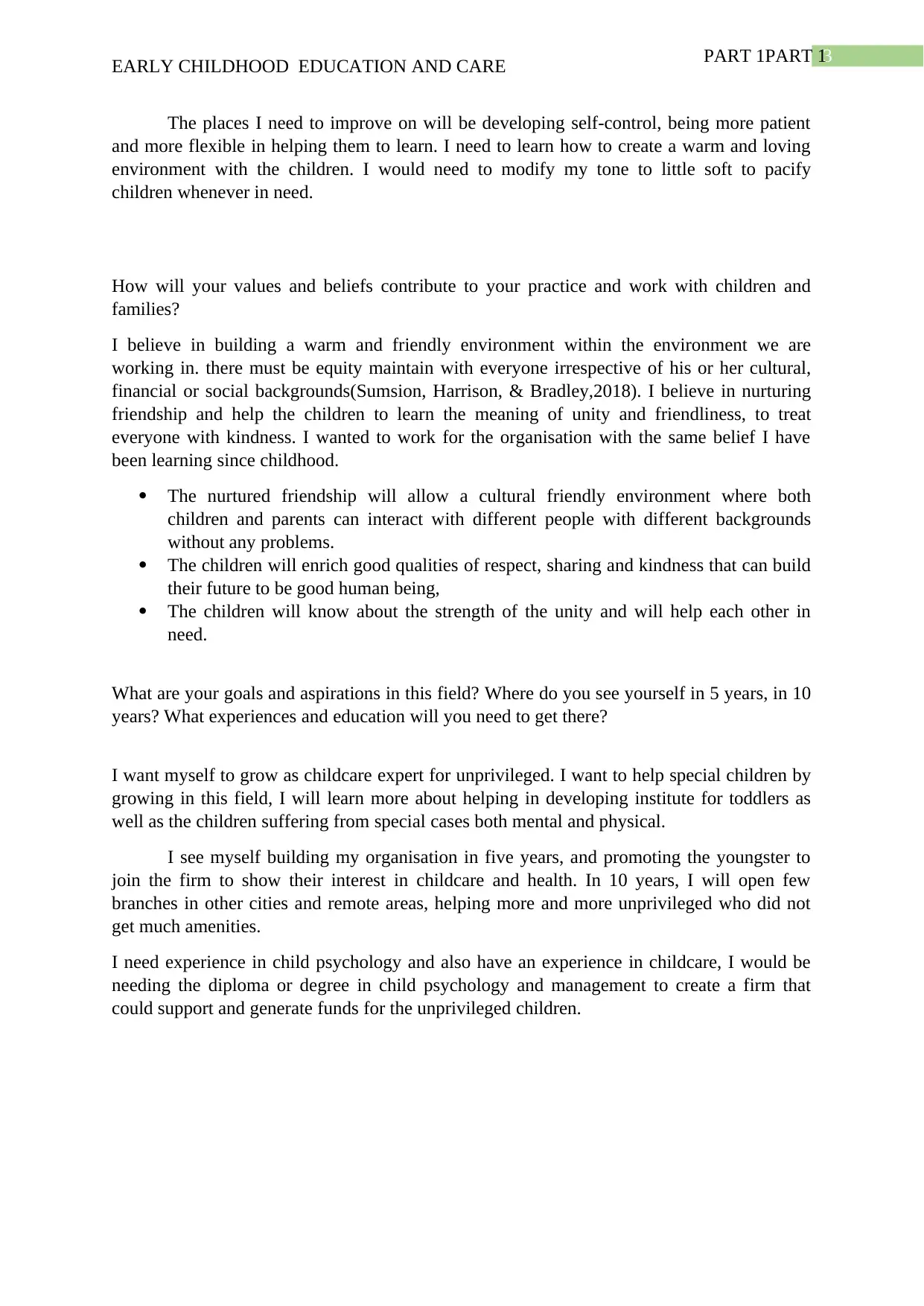
3PART 1PART 1
EARLY CHILDHOOD EDUCATION AND CARE
The places I need to improve on will be developing self-control, being more patient
and more flexible in helping them to learn. I need to learn how to create a warm and loving
environment with the children. I would need to modify my tone to little soft to pacify
children whenever in need.
How will your values and beliefs contribute to your practice and work with children and
families?
I believe in building a warm and friendly environment within the environment we are
working in. there must be equity maintain with everyone irrespective of his or her cultural,
financial or social backgrounds(Sumsion, Harrison, & Bradley,2018). I believe in nurturing
friendship and help the children to learn the meaning of unity and friendliness, to treat
everyone with kindness. I wanted to work for the organisation with the same belief I have
been learning since childhood.
The nurtured friendship will allow a cultural friendly environment where both
children and parents can interact with different people with different backgrounds
without any problems.
The children will enrich good qualities of respect, sharing and kindness that can build
their future to be good human being,
The children will know about the strength of the unity and will help each other in
need.
What are your goals and aspirations in this field? Where do you see yourself in 5 years, in 10
years? What experiences and education will you need to get there?
I want myself to grow as childcare expert for unprivileged. I want to help special children by
growing in this field, I will learn more about helping in developing institute for toddlers as
well as the children suffering from special cases both mental and physical.
I see myself building my organisation in five years, and promoting the youngster to
join the firm to show their interest in childcare and health. In 10 years, I will open few
branches in other cities and remote areas, helping more and more unprivileged who did not
get much amenities.
I need experience in child psychology and also have an experience in childcare, I would be
needing the diploma or degree in child psychology and management to create a firm that
could support and generate funds for the unprivileged children.
EARLY CHILDHOOD EDUCATION AND CARE
The places I need to improve on will be developing self-control, being more patient
and more flexible in helping them to learn. I need to learn how to create a warm and loving
environment with the children. I would need to modify my tone to little soft to pacify
children whenever in need.
How will your values and beliefs contribute to your practice and work with children and
families?
I believe in building a warm and friendly environment within the environment we are
working in. there must be equity maintain with everyone irrespective of his or her cultural,
financial or social backgrounds(Sumsion, Harrison, & Bradley,2018). I believe in nurturing
friendship and help the children to learn the meaning of unity and friendliness, to treat
everyone with kindness. I wanted to work for the organisation with the same belief I have
been learning since childhood.
The nurtured friendship will allow a cultural friendly environment where both
children and parents can interact with different people with different backgrounds
without any problems.
The children will enrich good qualities of respect, sharing and kindness that can build
their future to be good human being,
The children will know about the strength of the unity and will help each other in
need.
What are your goals and aspirations in this field? Where do you see yourself in 5 years, in 10
years? What experiences and education will you need to get there?
I want myself to grow as childcare expert for unprivileged. I want to help special children by
growing in this field, I will learn more about helping in developing institute for toddlers as
well as the children suffering from special cases both mental and physical.
I see myself building my organisation in five years, and promoting the youngster to
join the firm to show their interest in childcare and health. In 10 years, I will open few
branches in other cities and remote areas, helping more and more unprivileged who did not
get much amenities.
I need experience in child psychology and also have an experience in childcare, I would be
needing the diploma or degree in child psychology and management to create a firm that
could support and generate funds for the unprivileged children.
Paraphrase This Document
Need a fresh take? Get an instant paraphrase of this document with our AI Paraphraser
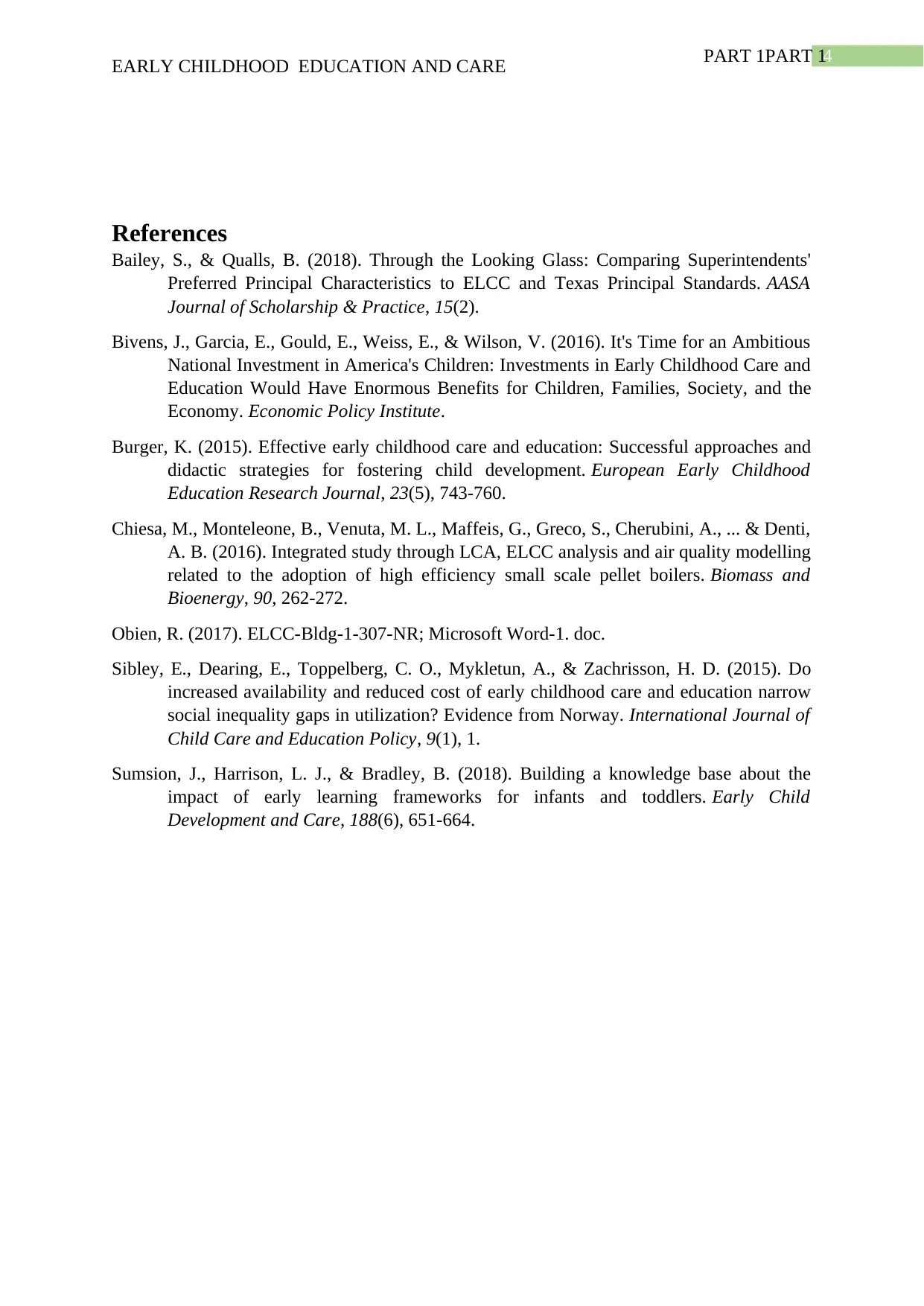
4PART 1PART 1
EARLY CHILDHOOD EDUCATION AND CARE
References
Bailey, S., & Qualls, B. (2018). Through the Looking Glass: Comparing Superintendents'
Preferred Principal Characteristics to ELCC and Texas Principal Standards. AASA
Journal of Scholarship & Practice, 15(2).
Bivens, J., Garcia, E., Gould, E., Weiss, E., & Wilson, V. (2016). It's Time for an Ambitious
National Investment in America's Children: Investments in Early Childhood Care and
Education Would Have Enormous Benefits for Children, Families, Society, and the
Economy. Economic Policy Institute.
Burger, K. (2015). Effective early childhood care and education: Successful approaches and
didactic strategies for fostering child development. European Early Childhood
Education Research Journal, 23(5), 743-760.
Chiesa, M., Monteleone, B., Venuta, M. L., Maffeis, G., Greco, S., Cherubini, A., ... & Denti,
A. B. (2016). Integrated study through LCA, ELCC analysis and air quality modelling
related to the adoption of high efficiency small scale pellet boilers. Biomass and
Bioenergy, 90, 262-272.
Obien, R. (2017). ELCC-Bldg-1-307-NR; Microsoft Word-1. doc.
Sibley, E., Dearing, E., Toppelberg, C. O., Mykletun, A., & Zachrisson, H. D. (2015). Do
increased availability and reduced cost of early childhood care and education narrow
social inequality gaps in utilization? Evidence from Norway. International Journal of
Child Care and Education Policy, 9(1), 1.
Sumsion, J., Harrison, L. J., & Bradley, B. (2018). Building a knowledge base about the
impact of early learning frameworks for infants and toddlers. Early Child
Development and Care, 188(6), 651-664.
EARLY CHILDHOOD EDUCATION AND CARE
References
Bailey, S., & Qualls, B. (2018). Through the Looking Glass: Comparing Superintendents'
Preferred Principal Characteristics to ELCC and Texas Principal Standards. AASA
Journal of Scholarship & Practice, 15(2).
Bivens, J., Garcia, E., Gould, E., Weiss, E., & Wilson, V. (2016). It's Time for an Ambitious
National Investment in America's Children: Investments in Early Childhood Care and
Education Would Have Enormous Benefits for Children, Families, Society, and the
Economy. Economic Policy Institute.
Burger, K. (2015). Effective early childhood care and education: Successful approaches and
didactic strategies for fostering child development. European Early Childhood
Education Research Journal, 23(5), 743-760.
Chiesa, M., Monteleone, B., Venuta, M. L., Maffeis, G., Greco, S., Cherubini, A., ... & Denti,
A. B. (2016). Integrated study through LCA, ELCC analysis and air quality modelling
related to the adoption of high efficiency small scale pellet boilers. Biomass and
Bioenergy, 90, 262-272.
Obien, R. (2017). ELCC-Bldg-1-307-NR; Microsoft Word-1. doc.
Sibley, E., Dearing, E., Toppelberg, C. O., Mykletun, A., & Zachrisson, H. D. (2015). Do
increased availability and reduced cost of early childhood care and education narrow
social inequality gaps in utilization? Evidence from Norway. International Journal of
Child Care and Education Policy, 9(1), 1.
Sumsion, J., Harrison, L. J., & Bradley, B. (2018). Building a knowledge base about the
impact of early learning frameworks for infants and toddlers. Early Child
Development and Care, 188(6), 651-664.
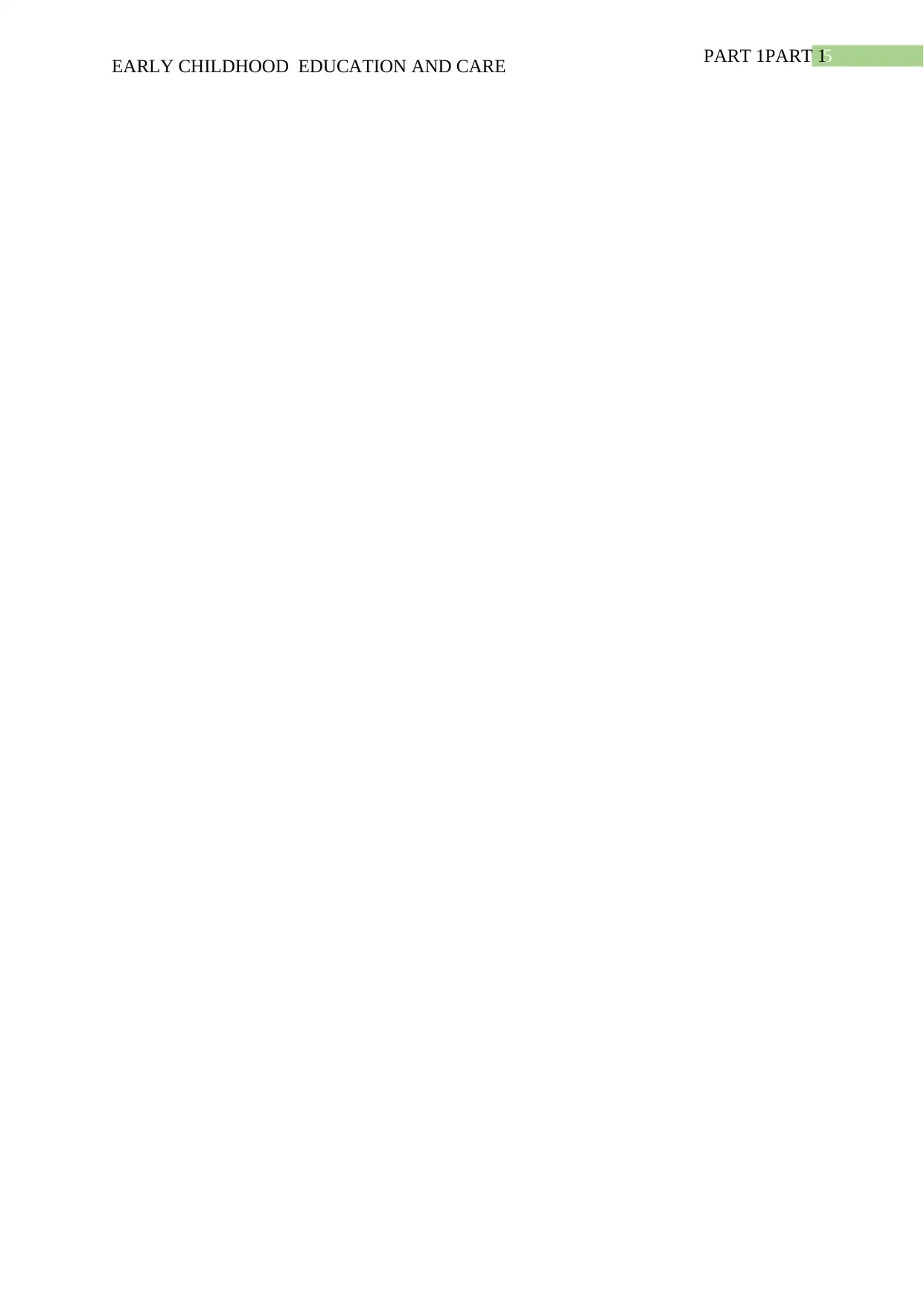
5PART 1PART 1
EARLY CHILDHOOD EDUCATION AND CARE
EARLY CHILDHOOD EDUCATION AND CARE
⊘ This is a preview!⊘
Do you want full access?
Subscribe today to unlock all pages.

Trusted by 1+ million students worldwide
1 out of 6
Related Documents
Your All-in-One AI-Powered Toolkit for Academic Success.
+13062052269
info@desklib.com
Available 24*7 on WhatsApp / Email
![[object Object]](/_next/static/media/star-bottom.7253800d.svg)
Unlock your academic potential
Copyright © 2020–2026 A2Z Services. All Rights Reserved. Developed and managed by ZUCOL.


